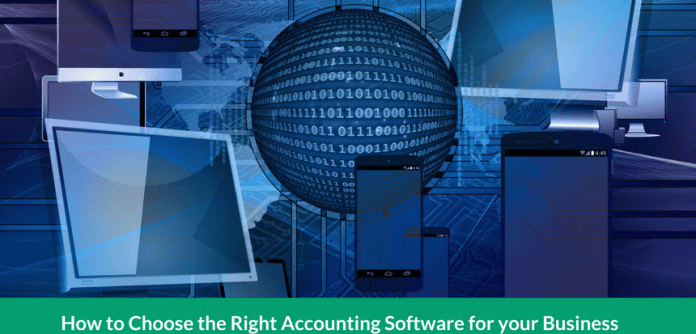Choosing the right accounting software is crucial for managing the finances of a business effectively. With many options available in the market, it can get overwhelming to decide which one to opt for. This comprehensive article will Guide to Choose Right Accounting Software that meets your specific business requirements.
Importance of Accounting Software
Using an accounting software provides several benefits that can help manage accounts better and grow the business. Some key advantages include:
- Improves accuracy by reducing human errors in calculations
- Saves time with automated processes for tasks like invoicing, billing, etc.
- Provides insights through real-time reporting and analytics
- Ensures compliance with regulations around bookkeeping and taxes
- Scales with ease as per business growth requirements
- Enables remote accessibility through cloud-based options
- Considering these factors, investing in the right accounting platform is imperative, regardless of the size and stage of your business.
Factors Considered for Selection
With a plethora of accounting software products in the market, how do you decide which one is the best fit? Here are some key considerations when choosing accounting software:
- Business Size
Accounting needs for a small business with a few employees are quite different from that of a mid-sized company or a large enterprise. For instance, smaller businesses might benefit more from simplistic, easy-to-use systems rather than advanced software with extensive features. Understanding needs based on the scale of operations is essential. - Industry Specific Needs
Businesses across different industries have unique accounting requirements. For instance, software needs of an eCommerce firm will vary vastly compared to a construction company. Options like Shopify and QuickBooks cater more specifically to online retail businesses. While solutions like Sage 300 Construction focus deeply on construction industry needs. - Scope of Functionalities
Analyze if you need just core accounting capabilities like invoicing and reporting, or more advanced features like inventory management, payroll processing, budgeting and forecasting, etc. Cloud accounting systems today provide end-to-end functionalities across the financial operations of a business. Identify which capabilities are relevant for long term growth. - Deployment Method
While desktop accounting continues to remain popular with many small businesses, cloud-based systems are gaining rapid traction. Evaluate aspects like mobility needs, data security preferences, hardware requirements, etc. to decide between on-premise vs SaaS deployment for your workflow. - Scalability Needs
As your customer base grows and transaction volumes surge, the accounting system should be flexible to scale up seamlessly. Cloud options score better in this aspect for fast growing businesses compared to in-house servers. - Data Security
Protection of sensitive financial data becomes paramount, especially to comply with regulations. Evaluate aspects like data encryption, access controls, disaster recovery mechanisms etc. during vendor evaluation. - Ease of Use
The software should enable faster staff onboarding and ease in adoption across roles like accounts, sales, inventory managers etc. that need to access the system frequently. If the platform is too complex, the learning curve can impact productivity. - Reporting & Analytics
Real-time insights into all aspects of financials help better decision making for the business. The depth of reporting also facilitates tax filing and regulatory compliance. Hence powerful analytics and reporting capabilities should be key checklist items. - Budget
Pricing models differ vastly from per user fee, to monthly subscriptions, to customized enterprise level agreements. Have clarity on how much you can invest currently and what pricing models offer better ROI in line with your growth roadmap. - Customer Support
Excellent after-sales support reflects genuine commitment of service providers. Options like online resources, community forums, telephonic assistance etc. should be evaluated when you are researching vendors.
Leading Accounting Software Products
While there is no shortage of options for accounting platforms, here is a quick summary of some leading established products in the market across three key segments:
Accounting Software for Small Businesses
QuickBooks – A full-featured accounting solution with intuitive UI catered to micro, small and mid-sized businesses across industries.
Xero – Cloud-based platform with seamless collaboration for accountants and bookkeepers suits independent contractors and solopreneurs.
Zoho Books – Affordable and easy to use online accounting solution ideal for service based small businesses.
Wave – Free invoicing, accounting, payroll and payments platform for entrepreneurs, consultants, freelancers.
Mid Market & Large Enterprise Accounting
NetSuite ERP – Flexible cloud ERP suite with financial management, planning, and analytics for scaling rapidly.
Sage Intacct – Web-based system for multi-entity finance and operational management with advanced automation.
SAP S/4HANA – Highly customizable industry specific ERP for large enterprises with high volume transactions.
Microsoft Dynamics 365 – Integrated modular apps for financial operations to sales, marketing needs of mid to large sized firms.
Accounting Software for Specific Industries
Xero Practice Manager – Purpose built cloud practice management platform for accountants and bookkeepers.
Deltek Ajera – Robust apps tailored for architecture and engineering professional services firms.
Shopify – Integrated omnichannel retail POS, payments platform with accounting capabilities.
Fishbowl Inventory – Specialized inventory tracking and manufacturing solution for wholesalers, distributors.
Also Read About :- QuickBooks vs Sage
Key Takeaways
With multiple vendors offering accounting platforms, identifying the ideal solution for your business needs careful evaluation. Begin by analyzing your workflows, industry specific challenges, scalability needs and budget.
Shortlisting options that serve your priorities today as well as futuristic goals can provide long term value. The key is finding the optimal blend of functionalities, ease of use and flexibility at a viable total cost of ownership.
Investing some effort to choose the right financial management platform lays a robust growth oriented foundation for the business.
